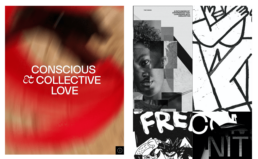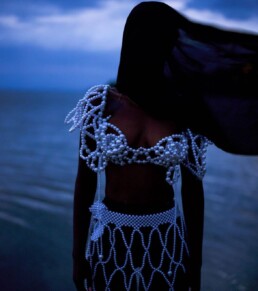Fashion Experience – Decolonize Fashion
The decolonization of fashion is increasingly gaining importance, especially in the United States. But what about this development in the German/European fashion landscape?
The decolonization of fashion is a process that critically examines the colonial practices, continuities, structures, and narratives that have shaped the fashion industry. It involves investigating how colonialism has influenced fashion on an institutional level, such as through the exploitation of resources, labor, and cultural appropriation. It also involves confronting whiteness and reflecting on it during the process of colonial reckoning. Who should decolonize whom? Why should we rather talk about Deconstruct Fashion? This process requires a rethinking, unlearning, and the acceptance and relevance of Black and Indigenous knowledge productions.
Decolonizing Fashion means, among other things, following a critical African/Afrodiasporic perspective:
To decolonize fashion, power and control must be shifted away from the dominant Western perspective, and the voices and experiences of marginalized communities, Black, Indigenous, and People of Color, must be centered!
In plain terms – Decolonize Fashion cannot happen without cultural diversity!
Some key aspects of decolonizing fashion are:
Redefining beauty standards: Decolonizing fashion means questioning the Eurocentric beauty norms imposed on the industry. This entails considering different body types, skin colors, and cultural expressions.
Decolonizing fashion also involves examining exploitative labor practices, such as Waste Colonialism. The disposal of excessive consumption from the global North in the global South at the expense of the climate and the environment.
Another widespread example is African textiles, primarily perceived as crafts rather than design. The classification of traditional crafts as something other than modern, contemporary design is shaped by Eurocentric thinking and devalues African cultures. We should strive to eliminate false distinctions between crafts and design to recognize all culturally significant forms of production.

What does this mean for fashion?
To understand the importance of decolonization in fashion design, it is crucial to first clarify the terms. The term “colonization” originates from the experiences of Black and Indigenous peoples. The realization that capitalism is “an instrument of colonization” and that it is therefore almost impossible to truly decolonize Western society.
How does colonization manifest in fashion?
One way is through cultural appropriation. Cultural appropriation means that, in our case, fashion brands, fashion companies, or institutions adopt aspects of culture from other cultures without their consent, thus appropriating and placing themselves in a position of authority, usually for profit.
The origin of this capitalist fashion system is structural racism, or the exploitation and colonization of Indigenous peoples and African countries, as well as the embedding of Western ideology into society.
In our event, we will introduce various designers who offer solutions and thus transform the colonial fashion industry.
Meet the fashion entrepreneur – The Revival
The fashion installation, Farming Fashion: Bridging the Divide will give us insight of what fashion can do. Step into a world where discarded textiles become a source of creativity and
empowerment. “Farming Fashion” is an immersive installation by The Revival, showcasing how African communities are reimagining textile waste. You’ will be transported to the heart of Ghana, where the impacts of global textile waste dumping are felt deeply. Through captivating visuals and sounds, witness the journey of these fabrics from the Global North to Africa.
Amidst the chaos, The Revival saw opportunity. African artisans and designers are turning scraps into treasures, creating economic opportunities. Art pieces made from upcycled textiles symbolise this transformation, surrounded by interactive display showcasing innovative design of protective uniforms for farmers. Explore the installation and confront the unjust relationship between agriculture and fashion. “Farming Fashion” challenges us to rethink our approach to waste and fashion, envisioning a future where creativity fuels sustainability and Africa leads the way in shaping its destiny.
Meet the designer – Amike Studios
The fashion performance – “Poetic Threads: A Rwandan Fashion Journey“ will guide us into new fashion africa narratives.
Step into Rwandan culture with “Poetic Threads,” a fashion performance where poetry, music, and intricate beadwork blend to tell stories of tradition and heritage. Designer Aline Amike, brings the essence of Rwanda to life on the runway, with each garment woven with beads depicting connectivity from Rwandan life.
Models become storytellers, moving to a mix of traditional melodies and modern beats that echo the heartbeat of Rwanda. Through poetry and beadwork, the audience is transported on a journey through the landscapes and stories of Rwanda, celebrating its rich cultural tapestry.
Meet the designer – Dennis Chuene
The fashion performance – The magic you’re waiting for is in the work you’re avoiding
Dennis Chuene weaves in a mythology that is African and offers introspective perspective, that personifies emotions in apparel. In collaboration with the Freestep we will experience an ART IN MOTION performance.
The Freestep is an extraordinary machine that was developed and spearheaded by the London-based designer Paul Gaba whose mission is to enhance the experience of urban commuters. The concept is based on two key ideas: the energy you effortlessly put into walking and utilizing this power in a low-impact transport mode. The result of this is an immensely comfortable, enjoyable, and safer journey achieved through natural stepping actions.
Freestep’s pays homage to the early bike designs such as the penny-farthing the first known machine to be called “a bicycle” as well as borrowing and bettering elements of favourites such as the BMX, the mountain bike and most current ultra-trendy fixed gear ‘messenger bike’.
Meet the designer – Paul Kadjo
The fashion performance – Knitting the Future “Knitting the Future” is a groundbreaking art concept that celebrates the potency of knitting through the utilization of banana fibers. Through an innovative approach to upcycling, the young and visionary designer, Paul Kadjo, cordially invites you to engage in his extraordinary journey of expanding consciousness. Anticipate an artistic exhibition where you not only attend and learn about the banana fiber but also actively participate by knitting an artwork.
Last but not least there is the chance to see a special PAUL KADJO Fashion Performance. With this art concept visitors will immerse themselves in an unfamiliar world full of art and creativity, breaking the usual clichés in the ecological, social and political context to create an innovative awareness of thevalue of the banana and its new associations. Join us and be part of „Knitting the Future“!
Meet the designer – Masa Mara
The fashion performance HEALING THE ROOTS
In Africa’s heart, where ancient roots entwine, Lies a land of resilience, a story divine. Beneath the soil, where histories sleep, Whispers of healing softly seep. From Timbuktu’s sands to the Nile’s embrace, A tapestry of cultures, a vibrant space. Through trials and triumphs, the roots endure, Nourished by hope, steadfast and pure.
In the cradle of civilization, where time began, Rise voices of unity, a harmonious plan. Healing hands reach out, bridging divides, Mending wounds, where love abides. With each sunrise, a new chapter unfurls, As Africa’s roots bloom, transcending the swirls Of adversity, embracing the light, Guided by wisdom, shining bright.
So let us nurture the roots of Africa’s soul,With empathy, compassion, making whole. For in healing the land, we heal our own, In unity and love, seeds are sown.
Experience a fashion event, that questions the status Quo’s in fashion. What does it mean to decolonize fashion? Using participatory methods, like sound, fotografs, and film. Let us enjoy the creativity and empower ourselves by breaking stereotypes and changing the narrative. Dive into an experience that will allow you take immediate action and change the fashion system. What positive change do you want to see? Explore the vibrant world of decolonizing fashion and let your senses be ignited through immersive experiences with sound, captivating photographs, and powerful films. Together, let’s celebrate creativity, shatter stereotypes, and rewrite the fashion narrative. It’s time to embrace empowerment and spark positive change. What vision of a better, more inclusive fashion future do you carry in your heart? Come, be part of the transformation.
Location: Design Zentrum Hamburg, Hongkongstraße 8 (Hafencity)
Time frame: 15.30 – 21:00
Limited space!
Free Entrance, the location is barrier-free
“Our Fashion Experience – Decolonize Fashion event is part of the Open Air DIGGAHH – Decolonial / Interactive / Social / Together / Current / Hanseatic City of Hamburg.”
DIGGAHH is an open-air event organized by Hamburg-based initiatives from civil society and the BIPoC community within the framework of “Hamburg Decolonize: An initiative for engaging with the city’s colonial heritage.” “Hamburg Decolonize” is a project of the Hamburg Historical Museums Foundation in cooperation with and funded by the Hamburg Ministry of Culture and Media. Supported by the Federal Cultural Foundation, which is funded by the Federal Government Commissioner for Culture and Media.”
Our event is a joint format with the exhibition “Conscious and Collective Love,” curated by Mawuto Dotou, who is a resident in the design category of the Fonds für Junges Design program at MK&G. Dotou developed the concept in collaboration with a small queer community in Togo. You will have the possibility to meet the curator at the museum MK&G ( Steintorplatz ) and join a drawing session. Under the title “Design Walk&Talk,” visitors are invited by Dotou to a guided tour of the exhibition at the MK&G. Afterwards, participants will join the designer for a “Walk” to the “Fashion Experience” event at the Design Center Hamburg.
The meeting point is 13:00h at the MK&G (Steintorplatz)
Guided tour and drawing session 13:00h – 15:00h

Foto Credit: Nina Zimolong / The Revival / Cornea Fotographhs / Mathias Weintz
Read more on Fashion Africa Now.














